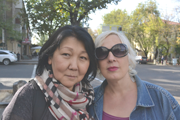The Russia Cycle
The Metro (1993)
I stood with my back against the far wall of the train car. I had pried my body in between an educated-looking man and two laborers. The two laborers were holding on to the bar which bordered the row of seats. I had been standing sideways facing the workers, but managed to wedge myself in against the wall so I wouldn’t fall down when the train lurched into motion as it left the metro station.
We arrived at the central most station in the city. After a wave of people emptied the car, I had an unobstructed view of the next tidal rush crowding onto the train. Their faces were set firm with grim hatred of their fellow citizens. Extremely literate wild beasts. A grey little old lady, her hair neatly brought back in a bun, pushed forward with the mass, her jaw held determinedly at a hard right angle. Her lower lip was pulled taut, baring a line of straight, white, even teeth.
I was knocked around against my wall as the women, laden with shopping bags, shoved and screamed at each other. A mass of lacquered, piled-up hair and sharp shoulder blades blocked my vision. I could only catch occasional glimpses of wrinkled, yammering jaws. The intellectual disappeared and another man appeared in his place. He commenced stepping on my toes. A squat old man put his arm across my chest as he took firm hold of the support bar next to the workers. His being was hard as stone and every place on my body he rubbed against hurt. The pain shot through my whole system. I tried to jostle him enough so that he would give me room to breathe. I was repulsed and mesmerized by the way the sparse white hairs grew out of his squat pink neck. I stood there, the smells of unwashed bodies and clothes, never-refrigerated foodstuffs forcing themselves up my nostrils, filling my being with nausea. I leaned back harder against the wall, wanting to escape. The train pulled into a station. Only two more stops. I hated the little old man for being so firmly planted. The two workers got off the train. The little old man moved forward to occupy both their places. He still held his stubby, rock-hard arm extended across my chest. The train jerked and his elbow hit my premenstrual nipple. A sharp jab of pain pierced me. I tried to lose myself in musing, worried that if I couldn’t forget my surroundings, I might not make it home.
The train pulled into the next station. The little old man turned around, taking a dozen tiny steps to do so. His slow, solid, precise movements irked me. I hoped it was his stop, but knew that this would be too good to be true. He stood with his back to me and gazed unwaveringly towards the exit. Another wave of nausea rattled my very bones. We arrived at my stop. The little old man moved slowly, again with small measured steps, towards the exit. I pushed forward roughly, inadvertently lifting another passenger’s shoe off his foot as I accidently stepped on his heel. I apologized, but he didn’t respond at all. He seemed not to have noticed.
We got to the escalator. There was a crowd of people gathered around it, approaching with minute, maddeningly slow steps. Chinese women with bound feet. Their bulk moved as one, a herd of back ailments and poorly fitting clothing, forever patient and willing to wait. Burdened by heavy packages and inadequate footwear, they had to be forever patient.
The crowd continued to shuffle towards the escalator, waiting to step onto it and be lifted away, one by one, from the heap. The mob pulled me into its depths. My stomach heaved and filled my mouth with acid. I spat it out onto the copper red hairdo of the woman in front of me, splattering her raincoat and groceries. She pretended nothing had happened. I vomited again. Simultaneously and unexpectedly, my hands flew out and started pulling the brassy hair out of her head. My fingers were full of hairpins. I struck out again and again. I felt the crowd respond in a wave of movement that pushed against me. I continued to lash out until I lost consciousness.
I woke up with my head cradled in the lap of the little old man. He was smoothing my hair and whispering soothing words into my crimson ear.
The Party (1994)
I mounted the last of the endless flights of steps and walked through the open door. I felt very much as if I were making an entrance, an entrance unnoticed by any. There was a screen hanging over the door to the kitchen so the only direction in which to go was the room where people were dancing. The lights were out and bad house music blasted out of a radio. I looked back and saw that my friends had finally caught up to me. I discerned Serge in the dark and greeted him. He kissed me on the cheek. I introduced my friends, switching back and forth between English and Russian. As I was describing my friends to Serge, explaining how I knew them, something about which I had never though in an American environment, he suggested we play a joke. He would pretend that I was saying awful things about them since they couldn’t understand a word I said. I wanted to protest that they were too sensitive not to be perturbed by such a game, but couldn’t think how to formulate the thought in Russian. I said nothing to him. I explained to them what his game was.
Serge wanted me to dance but I explained that I was still too sober. I looked for a way to open one of the beers I had brought. I asked Goga, one of the hosts. He suggested that one of the Russian boys might be able to help me. I went back to Serge and he found a way.
Later, I walked three blocks in the rain to a bar and purchased two six packs. I left one in the kitchen and kept the other by my side. After going out on the roof to cool off, I reentered the apartment to find Gary standing there, in all his testosterone glory. We played a game for a few minutes where he flirted with me to try to get a beer from my six pack. My friends were standing by. He asked to see what was in my hand. “Nothing,” I told him. He said, “Come here. I want to get close to you.” I insisted that I had nothing in my hand, that in fact I didn’t even have a hand. I gave him a beer and he had trouble twisting off the cap. I made him give it to me, but I could only get the top half off. Another Russian opened the bottle effortlessly. It was time for me to have another. I tried to open my own beer, but gave in to the right of Russian machismo and let Gary open it. All the time, I was making jokes about being a weak little thing. We laughed a lot. One of my American friends made a comment about me letting him perform this manly function. She disapproved.
I was sitting on a bed in a room full of Goga’s paintings. Yura from Kiev came and sat next to me. He said that after the previous party, two weeks earlier, he realized he should have given me his phone number. He chided himself for leaving and not even thinking of it. He said that if I ever wanted to speak Russian, I should call him.
“It’s necessary to speak in a human fashion from time to time,” he added. I could see that this speech was something he had weighed in his mind over the previous fortnight.
It had been clear to me on that earlier occasion that he found me attractive, that he was somewhat awed by me, a thoroughly American woman, seemingly without the inhibitions that plague Soviets. I had met with this reading of myself before, there. This time, however, my definition as exotica was mixed with comforting familiarity because I was both capable of and willing to communicate with him in his own language and within the parameters of his cultural norms. This separated me absolutely from the category of western woman. All this was clear from the pointed, morose way Yura regarded me. I recognized his admiration and was somewhat charmed. Yet, I felt no compunction about exploiting him to practice speaking Russian. I offered to give him my number in return. He thought it better if the exchange only happened one way. I insisted. He drew a frowning face on a plain white matchbook and wrote his number on the back. I made Yura tear a piece of paper off the bag that had contained beer. He promised not to bother me too much. I told him I wasn’t afraid of him. As I wrote down my phone number, he said, “Why? You gave it to much worse there, I suppose.” I didn’t understand him at first and agreed. Then, I retracted my statement but, before the conversation could continue, something else was occurring.
Still standing in the same room after my American friends had departed, one of the Russian boys ordered all the girls to dance. He amended his statement for the sake of acceptable American conduct to “Women, it’s time for you to all come dance.” I laughed. I stepped into the dark room and started dancing with Fedya. Everyone was dancing in couples, very suggestively, although they were changing partners with great frequency. I danced until the sweat was pouring off my body and then went out on the roof to cool off. As I was walking there, I ran into David. Shortly after I entered the warehouse that evening, David had spoken to me, claiming to have met me at a previous affair. He immediately caught on that I didn’t remember him. I pressed him for details of what we had talked about. He couldn’t remember. A Georgian past youth walked up and asked me if I were Russian. I told him I was American and he turned from me to David and reiterated his question.
“What? It’s not worth it to make my acquaintance then?” I asked in Russian, and stepped out onto the roof.
Later, I went back to dancing for a bit, but was soon tired out. I didn’t like the dirty dancing stunts, particularly because they seemed so arbitrary and I didn’t want just anyone rubbing up against me when I had sweat dripping in my eyes. I went back into the other room. The same Georgian approached me again and asked where I was from. I told him I was from America.
“No, really, in the beginning?” he said.
“I was born in Michigan,” I told him. He begged my pardon. It was my turn to find out his story. We spoke for a bit. During this exchange, Fedya came up behind me and wrapped his long arms around my shoulders. It made me nervous, though I knew the action held no significance. It became hard for me to speak Russian. The Georgian excused himself. He thought he was interrupting something.
While I had been sitting on the bed, a young blond guy from Leningrad, named Pasha, had placed himself at my feet. He left in 1990. He said he would gladly go back if conditions allowed. He objected to trying to make a capitalist out of himself.
“I had it all there,” he insisted, “my own apartment, my own car, my own family.” I expressed amazement that someone so young could be so rich. He informed me that he had made his living on the black market. He had never deceived the people, only the government. At a time when world market prices for gold were rising, the Soviet government was still producing pens with gold parts and selling them to citizens at controlled prices. He used to buy up great numbers of pens and sell the gold.
“I possessed containers this big full of gold. He held his hands held a yard apart. He stopped. “Perhaps this is boring you.”
“No,” I asserted. “On the contrary, it’s interesting. I left Russia in September and since I came back, I have no one to talk to about these things,” I lamely tried to explain. He told me it was a lie that everything had been horrible before. Life was livable. He had his own apartment, his own car. In America, he’s poor. He interrupted himself. “I don’t want to insult your country.”
“Don’t worry. There are a lot of things about America I don’t like,” I said.
“Well,” he continued, “It’s not so bad in America. It’s peaceful here. How old do you think I am?”
“I can never say when people ask me such questions,” I answered.
“Don’t worry. I’m not a girl,” he responded. I looked hard at him and tried to weigh what I would have thought his age in Russia, where people age so much more quickly than they do here. I started to say thirty, but amended it to twenty-eight.
“Twenty-nine,” he sighed. “When I arrived, people took me for a lad of eighteen. Life is so hard here. Oh well, it’s peaceful. You don’t have to worry about people trying to kill you.”
Noticing an empty whisky bottle next to him, I asked whether it was he who had taken Gary’s bottle (concerning the disappearance of which Gary had earlier stirred up a ruckus). He admitted that he saw it on the table and made it his own. He offered me a cigarette. It was a Marlboro Light. He confessed that they weren’t his either. He had been in a bar and spied them on a table. He took them for himself.
Mamuka, another of the hosts, wanted my last beer. I complained a bit and he gave it back to me. “You’re a guest,” he complied. Feeling guilty, I wandered into the kitchen to see if there were any strays to offer him. Looking bored, sitting in a chair was Serge. He invited me to sit with him. I suggested he come into the other room with me. We sat on the bed and watched someone roll a joint. He turned to me.
“I hate drugs.”
“It makes no difference to me,” I responded. “I just don’t use them. You know, in Russia now, they use a lot of drugs, and not just marijuana. People take heroin, with syringes.”
“That’s awful. It’s better to have sex.”
“But in Russia it’s not acceptable to have sex,” I countered. Our heads bent close together, we laughed long and hard.
The Meal (1992)
Sitting in the canteen. Sunlight pours in, stirring up the dust and revealing the cracks in the walls. The air is filled with hot empty steam that emanates from food containing little nourishment. The steam mixes with the smell from the espresso machine, pleasantly, richly aromatic in this context. In another context, the espresso would be scorned for pedestrian Maxwell House.
I am eating my lunch. Finding nothing else even marginally palatable, I have purchased a couple hunks of black bread and the soup of the day without meat, or, as it is called in Russian, without-meat soup. This in actuality means that the women on the cafeteria line neglect to throw in the hunk of rotting, boiled meat which habitually resides at the bottom of the bowl, having immediately sunk there soon after making a plop noise. There is no knowing which animal the meat has been harvested from, for, as a friend of mine recounted before this first visit to Russia, “Meat is meat. No further explanation is required.”
I have a hunk of bread grasped in my right hand. I occasionally dip it into the broth, and alternately spoon the stuff into my mouth with my left hand. I have forgotten my jar of garlic powder upstairs in my dorm room. My roommate has disappeared with the key to our room so it is torture to force down this bland repast. A wave of Americanism washes over me and I examine what I am eating. The broth is slightly yellower than ordinary tap water. This could be due to rust in the pipes. The soup contains a few shreds of carrots, some ziti noodles and potatoes. I realize that I am consuming three kinds of starch and nothing else. I give up on the soup.
My taste buds are screaming for flavor. I approach the espresso bar. The woman who sells the coffee and candies is not in sight. I wait a few minutes, precious though they are because I must soon hurry to Russian language lab. She arrives in no great hurry. I purchase a large coffee, the size of an American espresso, and six “chocolates.” The candies are in fact chunks of sugar paste covered with a dark brown waxy substance. For all this I pay twenty-eight rubles, about a quarter. I go back to my seat and consume the sugar voraciously. This dessert tastes like something, albeit unsubtle. I save half the coffee for my after-meal cigarette. Like many other people, I find that tobacco after eating helps the digestion. This is an unnecessary function at the present moment since I have hardly eaten anything. But rituals usually continue to be practiced long after their original purpose has ceased to exist.
The cigarette tastes good. I bought several cartons of Camels in Washington-Dulles Airport before my departure and find that they do well to break the monotony of flavorlessness. Thus satisfied with this charade of a nourishing lunch, I gather up my books and go practice pronouncing the difference between soft and hard [a].
After class, I am still hungry.
Shoulders set square, we prepare to make our entrance. As I have observed everywhere in St. Petersburg, when there is a set of double doors, one of them is propped open while the other is locked shut. This means that the first battle we do is on the stoop. Only one person can pass through the door at a time without making what I consider rudely close physical contact. Following my useless American manners, I allow a couple of women heavily burdened with shopping bags to pass me on their way out. Perceiving that an endless number of shoppers could take advantage of this while other people wanting to enter the bakery are leaning into me from pushed from behind, I finally elbow and shoulder my way through the narrow doorway and into a solid crowd. My roommate takes her place at the end of the line for the cash register while I, in turn, shove my way through the mass of people, continually apologizing. I make my way to the counter at which they hand out the loaves and see that they have both white and black bread, at 8 rubles 90 kopeks and 9 rubles a loaf, respectively. I backtrack to the pastry counter and see that they are selling the kind we like, a filo dough like substance containing raisins or currants. I fight my way back to the roommate and inform her of what is to be had. We decide to purchase a loaf of each kind of bread and four of the pastries. Since the pastries cost 3 r. 40 k. each, our purchases come to 31 rubles 50 kopeks. We begin to search our wallets for the proper change.
A woman tries to cut in front of us but another customer asks her what she thinks she’s doing. “Are you a mother of many children? No? Then to the end of the line with you like everyone else.” The woman is scared away and leaves in bad grace. We reach the register finally. We haven’t been able to come up with the exact change in kopeks. The woman behind the cash register yells at us, scowling. She pretends that the plate of kopek coins out of which she makes change is not on the counter in front of her. We stand there a moment, dumbfounded, while she continues to ring up other customers. Eventually, she concedes and gives us our ten kopeks in change along with two receipts.
We each take a receipt. My roommate stands in the bread line with hers. I approach the pastry counter and try to get the attention of the women on the other side of it. By the time I am successful in inducing them to take the receipt from my hand and tell them what it is for, they have run out of the pastries with the dried fruit in them. I negotiate and they give me the other kind, with no fruit, instead. My roommate and I battle our way out the door and onto the sidewalk. We compare our purchases. She has been more successful than I, having obtained both kinds of bread we paid for.
Shopping Cart

Your shopping cart is empty
Visit the shop










